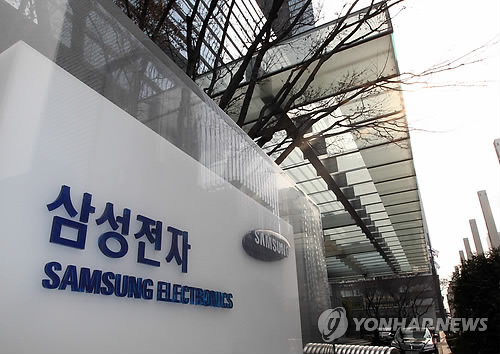Samsung Electronics Co. posted a near 8 percent drop in second-quarter net profit Thursday as its smartphone business remained sluggish on lackluster Galaxy S6 sales and harsh competition from Chinese rivals.
Net income came to 5.75 trillion won ($4.95 billion) in the April-June period, 7.97 percent down from 6.25 trillion won a year earlier, the world's top smartphone maker said in a regulatory filing.
Sales fell 7.29 percent on-year to 48.53 trillion won in the second quarter, and operating profit also dropped 4.03 percent to 6.89 trillion won.

Compared with three months earlier, net profit surged 24.35 percent and operating profit also climbed 15.36 percent, with sales moving up 3.01 percent.
Shares of Samsung Electronics were changing hands at 1,230,000 won as of 11:31 a.m. on the Seoul bourse, down 2.61 percent from the previous session. The second-quarter results were released before the market opened.
Samsung said the operating profit of the information technology and mobile business division, one of the company's main revenue sources, fell 37.5 percent on-year to 2.76 trillion won in the second quarter.
The company said handset sales lost 6.3 percent on-year in the second quarter to 89 million units, indicating that the Galaxy S6 series, which was kicked off in April, posted weak sales. Of the handset shipments, smartphones accounted for about 80 percent.
While a shortage in the supply of the Galaxy S6 Edge was also cited as one of the reasons for the dull result, Samsung said the issue has been solved.
Samsung's handset business has been suffering due to the rise of Chinese players rolling out price-competitive models, while sales of the Galaxy S6 and the Galaxy S6 Edge have remained weak.
Samsung took up 21.7 percent of the world's market for smartphones in the April-June period, down from the 24.8 percent posted a year earlier, the data compiled by industry tracker IDC showed. Other data also implied that its market share stood flat on-year over the cited period.
Samsung's device solution division, which covers the chip business, logged an operating profit of 3.87 trillion won, up 85.16 percent from the previous year, helping the tech giant offset a decline in its mobile business.
Of the amount, chips took up about 3.4 trillion won in the second quarter, up 82.8 percent on-year. It marked the first time for the chip business to rake in more than 3 trillion won in quarterly profits since the third quarter of 2010.
In a conference call, Samsung said its facility investment came to 5.9 trillion won in the second quarter, and first-half capital spending jumped 30 percent on-year to 13.2 trillion won.
Samsung also said it decided to pay an interim cash dividend of 1,000 won per share, up from 500 won paid out last year. The combined amount is estimated at 148.9 billion won.
For the remainder of 2015, Samsung said the growth of its smartphone business is anticipated to maintain limited growth. The company said it will adjust prices of its flagship smartphones depending on market conditions and roll out handsets with wider screens to tap deeper into the high-end segment.
The tech giant is expected to roll out its next cross between a smartphone and a tablet PC, presumably the Galaxy Note 5, in August. The tech giant's earlier-than-expected release apparently came as its U.S. archrival Apple is expected to showcase the iPhone 6S and iPhone 6S Plus in September.
The company painted a rosy picture for its semiconductor business, however, saying the release of new smartphones with high-end features will help push up demand for its chip products as well.
Samsung, meanwhile, is expected to post a net profit of 5.7 trillion won in the third quarter of 2015, according to the median forecast of 18 local brokerage houses polled by Yonhap Infomax, the financial news arm of Yonhap News Agency. Operating profit and sales are estimated at 6.9 trillion won and 49.5 trillion won, respectively. (Yonhap)








![[KH Explains] Hyundai's full hybrid edge to pay off amid slow transition to pure EVs](http://res.heraldm.com/phpwas/restmb_idxmake.php?idx=644&simg=/content/image/2024/04/18/20240418050645_0.jpg&u=20240419100350)






![[From the Scene] Monks, Buddhists hail return of remains of Buddhas](http://res.heraldm.com/phpwas/restmb_idxmake.php?idx=652&simg=/content/image/2024/04/19/20240419050617_0.jpg&u=20240419175937)

![[KH Explains] Hyundai's full hybrid edge to pay off amid slow transition to pure EVs](http://res.heraldm.com/phpwas/restmb_idxmake.php?idx=652&simg=/content/image/2024/04/18/20240418050645_0.jpg&u=20240419100350)

![[Today’s K-pop] Illit drops debut single remix](http://res.heraldm.com/phpwas/restmb_idxmake.php?idx=642&simg=/content/image/2024/04/19/20240419050612_0.jpg&u=)